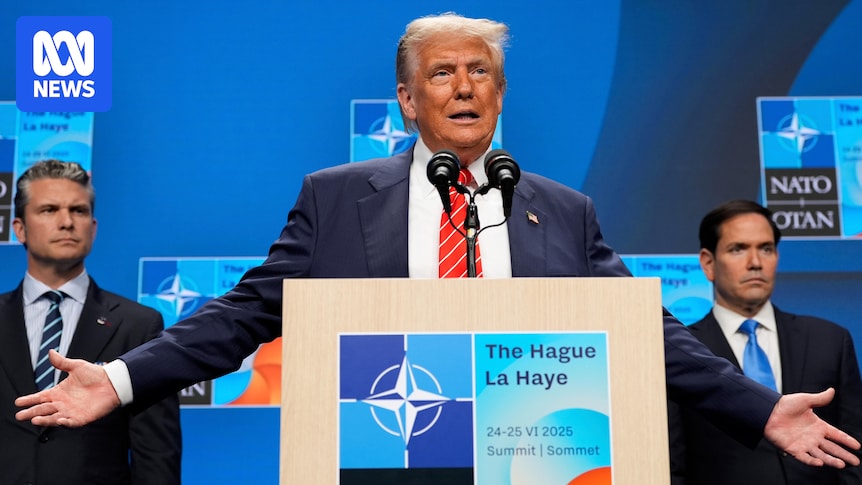US President Donald Trump has warned Iran he would order another bombing raid on its nuclear sites if Tehran resumed efforts to develop a nuclear weapon.
Speaking to reporters at the White House on Friday (US time), Mr Trump said he would “without question, absolutely” consider further military action if necessary.
His comments came as the number of Australians and family members in Iran registered with the Department of Foreign Affairs and Trade (DFAT) crisis portal grew to 3,200.
Australians still waiting to leave Iran
Soon after Israel began bombing Iran in mid-June, DFAT evacuated its staff from Tehran to Azerbaijan.
On the advice of DFAT, some Australians in Iran travelled to the Iran-Azerbaijan border hoping leave Iran last week but got knocked back by Azerbaijan officials in part because they didn’t have a special code, the ABC reported on Thursday.
Late on Friday, a DFAT spokesperson said the backlog of Australian requests for border crossing codes had been resolved.
They said DFAT was supporting Australians who wished to leave Iran secure seats on commercial flights that had begun operating out of the country.
A US government security alert said Iranian airspace had partially reopened, “although commercial travel from Tehran and other major hubs may be disrupted”.
Iranian-Australians ‘disillusioned’
Melbourne woman Maryam is worried for her mother, brother and his family who live in Iran.
“The possibility of war would take everything away, you know, and you worry about what would happen to them and just how we could support them in in all of this,” said Maryam.
A building damaged in Israeli strikes in Tehran in June 2025. (Reuters: Majid Asgaripour/West Asia News Agency )
Maryam’s mother is not an Australian citizen and while she has previously held visitor visas, she does not have a visa that is currently valid.
DFAT allows people who are citizens or their close relatives to register for emergency assistance via the crisis portal.
Maryam said Australia backing the US strikes against Iran did not sit well with many Iranians in Australia.
“I think every Iranian I talk to, they felt very disillusioned,” she said.
“You’re working here. You’re paying tax. We are trying to contribute to this society.”
There are more than 85,000 Iranian-born people living in Australia, according to Home Affairs.
Australian-Iranian Soroush, a civil engineer who works in fly-in fly-out jobs in West Australia, arrived back in Australia last week after leaving Iran via Turkiye.
A map showing Iran with the overland route from Tehran to Astara on the Azerbaijan border. (ABC News: Jarrod Fankhauser)
Soroush was in Iran visiting his parents and sister for the first time in two years, but his trip got cut short by the Israel-Iran war.
Soroush said he drove from Tehran to the border with Turkiye to escape — and faced chaotic situations trying to get out of Iran.
He had tried to register with DFAT but couldn’t get through the process because of a lack of internet access in Iran.
Iranian authorities have regularly cut off internet access in the country since the war with Israel broke out — on some occasions for days at a time.
Soroush took this photo in Tehran during the recent missile strikes. (Supplied)
“I couldn’t even phone my friends to tell them to do this for me, and then when I decided to exit from Turkiye,” Soroush said.
“I thought, ‘if I get stuck somewhere, I will continue registering’.”
Heated exchanges continue
As a fragile ceasefire between Israel and Iran continued to hold, there was further heated rhetoric from the White House in response to comments from Iran’s Supreme Leader Ali Khamenei.
Mr Trump scoffed at Ayatollah Khamenei’s warning to the US not to launch future strikes on Iran, as well as the Iranian supreme leader’s assertion that Tehran “won the war” with Israel.
Iran’s Foreign Minister Abbas Araghchi hit back at Mr Trump in a social media post on Saturday.
Abbas Araghchi says Donald Trump should stop hurting Ayatollah Ali Khamenei’s “millions of heartfelt followers”. (Reuters: Amr Abdallah Dalsh)
He said a potential nuclear deal was conditional on the US ending its “disrespectful tone” toward the supreme leader.
“If President Trump is genuine about wanting a deal, he should put aside the disrespectful and unacceptable tone towards Iran’s Supreme Leader, Grand Ayatollah Khamenei, and stop hurting his millions of heartfelt followers,” Mr Araghchi said on X.
Iran has rejected a request by the UN’s nuclear watchdog to visit sites bombed by the US and Israel, saying it suggested malign intent.
Behind the cover of war
Martin Hodgson is a senior advocate with the Foreign Prisoner Support Service, which works to get Australians detained or otherwise in jeopardy overseas back home.
He said he was currently assisting “more than 10” Australians seeking to leave Iran who feared not only Israeli bombs but also Iranian authorities, who he said many suspected were using the war as cover to detain those viewed as unfriendly to the regime.
Loading…
This could include Iranian-Australians who were known to be secular intellectuals, people of the Kurdish ethnicity, and Sunni Muslims, he said.
Iran’s theocratic regime and most of its population are of the Shia sect of Islam.
Iranian authorities said on Wednesday (Tehran time) they had executed three men they accused of spying for Israel.
Amnesty International’s deputy director for the Middle East and North Africa, Hussein Baoumi, said calls from Iranian officials for expedited trials and executions of those accused of collaborating with Israel showed an effort to “weaponise the death penalty to assert control and instil fear”.
“The authorities must ensure all those detained are protected from enforced disappearance, torture and other ill-treatment, and afforded fair trials at all times, including during armed conflict,” he said.
ABC/Wires
